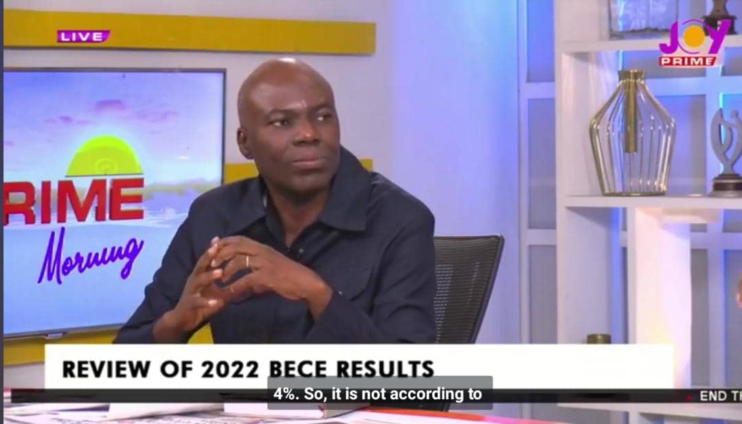The Head of the Legal Department of the West African Examinations Council, Rev. Victor Brew, has clarified the grading system used for the Basic Education Certificate Examination (BECE).
According to him, the performance of students at various schools determine their grades. The grades awarded to students from various schools are dependent on their performance.
Speaking to Roselyn Felli on Prime Morning, Monday, Rev. Victor Brew explained that students who may be the best in their schools may not meet the first 4% range targeted by the WAEC grading system as it is a nationwide competition.
"...it's the grading system and also the performance of their candidates, because mind you, if you're a local champion where you keep getting 80s, know that if someone else has been getting 99, then you pray that your 80 falls within the 4% otherwise, you're going to get a grade 2, and that doesn't mean you're not good. You’re good, but others are better," he explained.
For the purpose of the variation of the grading system, he urged school managers to avoid comparing cohorts of their institutions, as the "Norm-Referenced Grading System" used by WAEC varies yearly.
Rev. Victor Brew further revealed that the implementation of the grading system is done in collaboration with the government, thus making grade 9 the lowest and not a failure in the BECE system.
Explaining how the grading system is done, he said, "If the first 4% are to get grade 1, what it means is that if you took mathematics, unlike English, someone can get 100% in mathematics. So, what happens is that your candidate or the champion of your school in math gets 80% during your mock trials or 89%, but then when you join forces with the candidates across the country, the question is whether your champion in math in your school can beat all the champions across the country such that your champion falls within the first 4%."
For this reason, he said WAEC is not to be blamed for the failure of candidates, as a particular batch may not fall within the range of the national grading system for the year.
Meanwhile, he thinks a coalition of a total number of candidates acquiring a grade in each subject across the country within a year will inform policy-making so as to help improve the system.
Addressing the issue of the cancellation of the exams for some candidates, he said it is done based on the rules and regulations provided for the year groups before and during the exams.
He has also notified parents whose children’s papers have been cancelled that they are permitted to appeal for remarking.
Latest Stories
-
Gold Fields Ghana Foundation challenges graduates to maximize benefits of community apprenticeship programme
16 mins -
GBC accuses Deputy Information Minister Sylvester Tetteh of demolishing its bungalow illegally
27 mins -
Boost for education as government commissions 80 projects
38 mins -
NAPO commissions library to honour Atta-Mills’ memory
49 mins -
OmniBSIC Bank champions health and wellness with thriving community walk
51 mins -
Kora Wearables unveils Neo: The Ultimate Smartwatch for Ghana’s tech-savvy and health-conscious users
55 mins -
NDC supports Dampare’s ‘no guns at polling stations’ directive
58 mins -
Police officer interdicted after video of assault goes viral
1 hour -
KNUST’s Prof. Reginald Annan named first African recipient of World Cancer Research Fund
1 hour -
George Twum-Barimah-Adu pledges inclusive cabinet with Minority and Majority leaders
2 hours -
Labourer jailed 5 years for inflicting cutlass wounds on businessman
2 hours -
Parliament urged to fast-track passage of Road Traffic Amendment Bill
2 hours -
Mr Daniel Kofi Asante aka Electrician
2 hours -
Minerals Commission, Solidaridad unveils forum to tackle child labour in mining sector
2 hours -
Election 2024: Engagement with security services productive – NDC
2 hours

